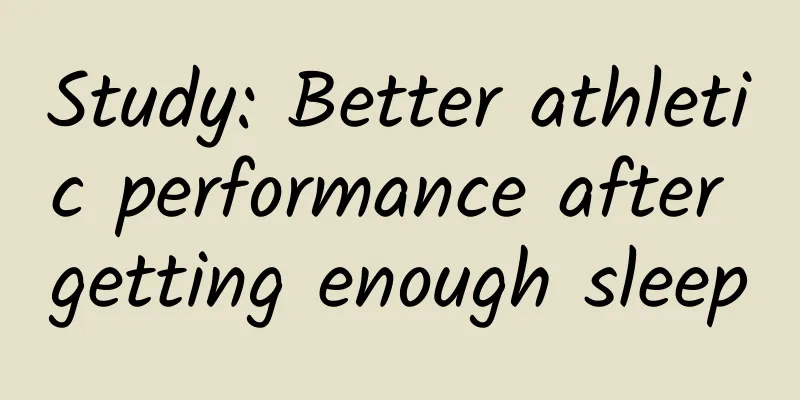Study: Better athletic performance after getting enough sleep

|
Aunt Sam translated the article "Building Better Athletes With More Sleep". Let's take a look: For professional athletes, getting enough sleep is sometimes harder than climbing a mountain. But even if you don’t get enough sleep, a few hours of sleep will still be helpful for your performance on the court. Sleep is a crucial element for the normal functioning of the human body. We've all had this experience: when we don't sleep well, nothing goes well. Without good sleep, whether it is long-term poor sleep or short-term staying up late, your mood, mind, cognition and motor ability will be deeply affected. There are only two ways to recover from a very tired body: sleep, and sleep well! Regarding athletes' sleep, most studies focus on the effects of sleep deprivation. The results were as expected, very strong! Like the average person, athletes’ performance in all areas will be significantly reduced if they do not get enough sleep all night or their sleep is interrupted. The effects of sleep problems appear to be more pronounced during specific exercises: single, high-intensity bouts of exercise can have an impact. Continuous and aerobic exercise suffered even greater impacts. Although gross motor skills (movements involving muscles throughout the body) are less affected by this, it is not easy for athletes to react quickly during competition if they do not get enough sleep! Touring around the country, arriving in the early morning, and competing the next day, it’s no wonder that sleep management is a headache for athletes. Rather than discussing the effects of insufficient sleep, it is more interesting to ask: Are there any benefits to getting more sleep? If an athlete gets a little more sleep than his or her competitors, will that give him or her an advantage during a competition? This is the question that Stanford University researcher Cheri D. Mah wanted to find the answer to. She contacted several athletes at the university and wanted to find a group of people to participate in the experiment. The content was: first, measure the athletic performance under normal sleep conditions; then, measure their athletic performance again after getting as much sleep as possible in the next few weeks. No one has ever done a similar experiment to see what effect increased sleep would have on athletes. Stanford University's men's basketball team volunteered to be Mah's research subjects. The 11 players used sensor bracelets to record their average sleep time, about 6 and a half hours a night. After two weeks of this schedule, Mah recorded their sprint, free throw, and three-point shooting performance. The athletes should continue for 5 to 7 weeks. The longer they sleep, the better, with the goal of 10 hours a night. The actual measurement results showed that their sleep time was 8 and a half hours. After the extended sleep period, the researchers obtained an unexpected result: the players' free throw and three-point shooting percentages increased by 11.4% and 13.7%, respectively; and the 282-foot sprint test (approximately 86 meters) improved by 0.7 seconds. Every player ran faster than before the experiment! You would only associate "13% improvement" with drugs or years of training, and would never imagine that getting enough sleep can have such an effect! Mah's research conveys a strong conclusion: for most athletes, the more sleep they get, the better their performance! But this is easier said than done! Athletes face too many problems with sleep that ordinary people don’t encounter or think about. First, many elite athletes travel year-round. Professional athletes spend most of their time on the road. American team athletes travel across the country, often flying around to catch up on schedules, but the people who make the schedules are unable to always take into account the athletes' day and night rhythms. The miles traveled by sports teams add up quickly, especially for teams on the West Coast, which are particularly far away from other teams in their league. Their mileage is usually higher compared to their competitors. In 2013, the Seattle Mariners flew 52,000 miles; the centrally located Chicago White Sox, closer to their rivals, logged just 23,000 miles that same year. In the NFL, the Los Angeles Kings fly more than 55,000 miles a year to play against other teams; the New Jersey Devils, however, typically fly less than 29,000 miles. Sports teams try to seek help from experts, like Mah, to deal with sleep issues. Most NBA players will take a nap between morning practice and evening games. NBA star Steve Nash once said in an interview with the New York Times, "Find time to take a nap on game days. These rests accumulate little by little and can make you better throughout the season. I wanted to improve this aspect, so I did it. At the end of the year, I felt that my condition had improved." Domestic travel is troublesome enough, but multi-sport athletes even have to fly back and forth between countries. Randy Wilber of the U.S. Olympic Committee points out that there is little research on how people who travel frequently for work, such as pilots, deal with jet lag. They can only use very few research results to help these elite athletes reduce the impact of travel. “We even had to start from the very beginning and develop the relevant protocols ourselves.” Does long-distance travel really have a negative impact on sports teams? There is not much research data at present. Bill Barnwell, editor of the American sports website Grandland.com, used 15 years of NFL data to analyze the relationship between team travel mileage and winning rate. He found that the winning rate of teams traveling more than 2,000 miles was 40%; at the same time, the winning rate of teams traveling less than 1,000 miles was 43%. This result is not good news for the Oakland Raiders, who traveled more than 28,000 miles in 2012; but their opponent, the Indianapolis Mavericks, only had to travel 8,494 miles. The effects of travel seem to add up, even over the course of an entire season. Researchers at Vanderbilt University analyzed baseball hitters' "plate discipline" over an entire season and found that hitters swung outside the strike zone more often late in the season than early in the season. Why? "We hypothesize that this decline is related to accumulated fatigue over the course of the season, which comes from frequent travel and lack of time off," said lead researcher Dr. Scott Kutscher in a press release. Dr. Kutscher's team also found that pitch selection ability gradually declines throughout the season, becoming more pronounced since 2006. This year, Major League Baseball began to ban players from using performance-enhancing drugs. (Note: The baseball club has been using a stimulant commonly known as green pills for several years.) The study was conducted in 2012, when 24 of the 30 major league teams observed declines. This means that if a team can find a way to solve the problem of fatigue, it will have an advantage in the game. The San Francisco Giants improved their hitter selection in the 2012 season, which led to their World Series win. It could be that the Giants have improved what they call "sleep habits," which include a regular bedtime, no bright-light clocks by the bed (studies show that light can also disrupt sleep), and a room that's a cool enough temperature for sleep. Think of sleep as a performance enabler rather than a chore that requires minimal effort. It’s actually a smart investment! This article is from Uncle Sam's Workshop This article is from Uncle Sam's Workshop |
<<: Whole grains + fruits and vegetables = liver detoxification? It turned out to be wrong...
Recommend
How to treat inflammation of the cervix and adnexitis
How to treat adnexitis and cervical inflammation?...
How to remove uterine fibroids? What should be paid attention to when removing uterine fibroids?
If uterine fibroids are not treated in time, it w...
What is the reason for a one-week delay in menstruation?
What are the reasons for delayed menstruation? Th...
General treatment of pelvic peritonitis
Pelvic peritonitis is a common disease, and the p...
Celebrities love skipping rope to burn fat and lose weight, and Guo Xuefu has a good figure by skipping rope! 3 unexpected benefits of skipping rope
Skipping rope is a combination of aerobic and ana...
Just one chair! Light yoga to reduce edema in the office
【Eliminate edema with the chair version of the ko...
Uterine hypoplasia can easily lead to dysmenorrhea
It is very common for women to have dysmenorrhea....
What does it feel like to have a miscarriage? You must pay special attention to your personal lifestyle habits
Many women may experience miscarriage after becom...
Understanding the symptoms of Trichomonas vaginitis
Trichomonas vaginitis is a very common disease, w...
How to quickly relieve menstrual pain
Women often experience dysmenorrhea during menstr...
Every time I have back pain, I have abnormal vaginal discharge
Lower back pain accompanied by abnormal vaginal d...
How do you know if you have an ovarian cyst?
The ovaries are the main organs of female physiol...
Six ways to prevent acute adnexitis
Acute adnexitis is mostly caused by some ascendin...
What medicine should I take for breast pain during menstruation
When patients experience breast pain during menst...
What are the health care measures for patients with uterine effusion?
In our daily life, we need to pay attention to so...









